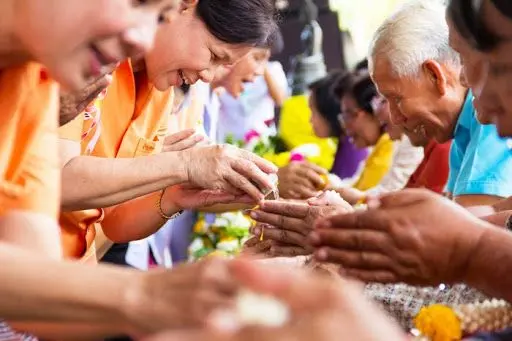By APD writer Alice
The Thai Department of Health has launched a campaign named “Save Parents” calling people nationwide to avoid visiting their parents and elderly family members during the Songkran Festival, known as Thai New Year, to protect the highly vulnerable from the novel coronavirus disease (Covid-19).
During a press conference to launch the campaign earlier this week, Dr Panpimol Wipulakorn, secretary-general of the department, said the campaign aims to make sure that during this important festival, senior citizens are safe from coronavirus. So it needs the response from young people who represent the country’s largest virus carrier group.
Under the campaign, young family members are asked to refrain from having physical contact or getting close to their elders, who are most vulnerable to the disease.
Although the government postponed national holidays and water splashing rituals during the Songkran Festival, which will run from April 13-15, Dr Panpimol said many people still want to return home to visit their parents and some might even defy the water splashing ban.
He asked young people to refrain from visiting elderly parents but communicate with them online instead.
According to the government’s Centre for Covid-19 Situation Administration (CCSA), social interaction with family members is a primary cause for infections among the elderly. Approximately 35% of patients in Bangkok aged 60 and above contracted Covid-19 from family members, 21% from friends, and 16% from regularly frequented places.
The mortality rate for patients aged 60-69 year from the disease is 0.7%. That figure rises exponentially to 10.5% for those aged 70-79, and 16.7% for those 80 and above.
With about 94% of the population following Buddhism, Thailand and many other countries in Southeast Asia such as Laos, Cambodia and Myanmar welcome the New Year according to the Buddhist calendar and the word "Songkran" implies innovation and development. In addition, the festival is also a cultural activity relating to the agricultural production in Southeast Asia. As part of the festival, the water-pouring ceremony called Rot Nam Dam Hua is a traditional rite for young people to show respect to elders and ask for their blessings.
Last month, the Thai government decided to postpone the Songkran holidays to observe social distancing and limit the movement of both local people and foreign tourists.
Thais are urged to avoid going to temples and bathe Buddha statues at home instead. They are also advised to observe social distancing by staying at least one metre away from each other and to wear sanitary masks.
On April 8, Thailand announced an additional 111 cases of Covid-19 and three deaths from the disease, bringing the total number of cases in the country to 2,369 with 30 fatalities. Of them, 42 were Thai Muslims returning from Indonesia after participating in religious festivals there, said Dr. Taweesin Visanuyothin, spokesman of the CCSA.
The capital Bangkok recorded the most coronavirus cases, numbering 1,223, followed by its neighboring province Nonthaburi with 41 cases and the tourist island of Phuket with 140 cases.
(ASIA PACIFIC DAILY)
 简体中文
简体中文



